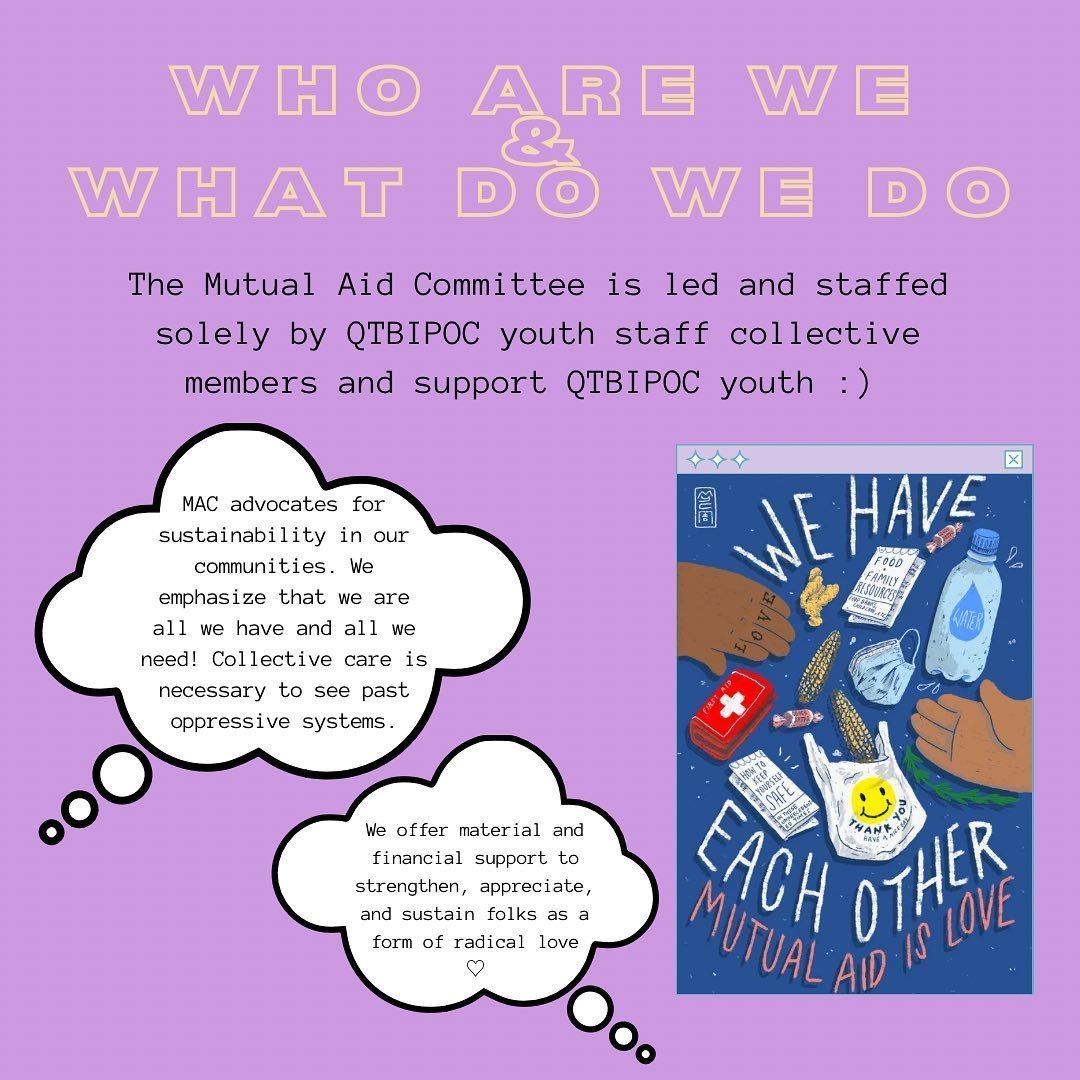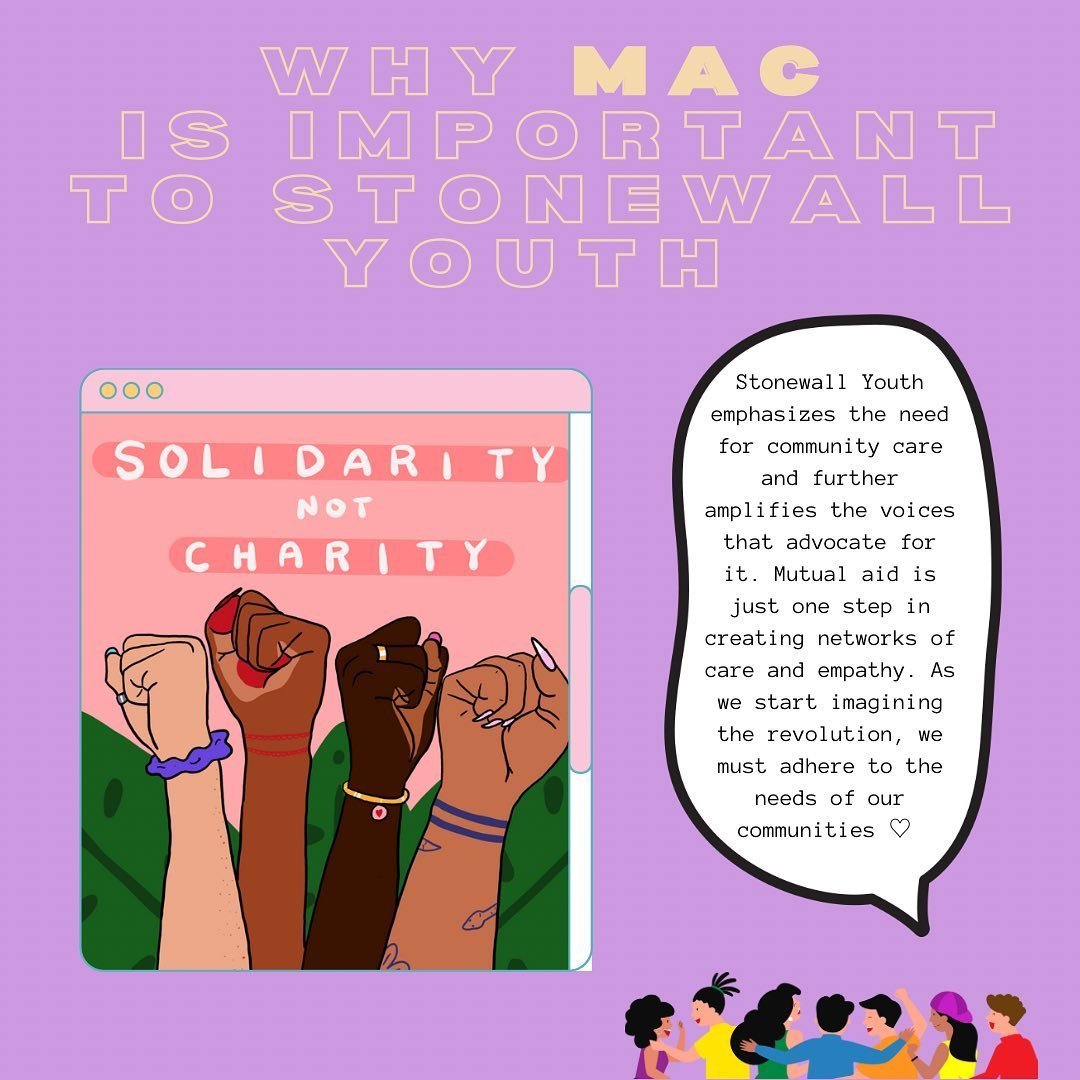Mutual Aid + Sustaining Youth Activism
“Mutual aid is the radical act of caring for each other while working to change the world.”
Early in 2020, Stonewall Youth expanded our mutual aid activities in response to community needs that were exacerbated by the pandemic. Some of this was driven by the fact that we suddenly had to do all of our programs online and wanted to redirect the funds, supplies, time, and other resources that we’d planned on using for in-person events and activities.
For example, instead of hosting dances, gatherings, and a dazzling array of other in-person activities, we increased our investment in purchasing essential items for youth, including food, gender-affirming items, and healthcare items/expenses. Stonewall Youth supports and engages in mutual aid because we are a social justice organization that explicitly values creating a culture of care, and we continue to provide mutual aid to our community as we re-open. Make a mutual aid request here.
In the spring of 2020, the anti-racist uprising and international Black Lives Matter movement renewed local anti-racist activism focused on abolition, ending police violence against black people, and generally, eradicating white supremacy. As part of our mutual aid work, Stonewall Youth distributed food, first aid supplies, and COVID supplies (such as facemasks) to folks at local anti-racist protests, rallies, and BIPOC healing gatherings.
The Black Lives Matter rally on the the 4th of July in Olympia
This led us to develop more strategies to support young BIPOC activists and BIPOC-led groups as a way of individuals doing that work aligns with our mission of building a community of care and addressing root causes of oppression. Anti-racist work and LGBTQ+ advocacy are forever linked. Not only did Black and other people of color start the LGBTQ+ Rights movement, but Stonewall Youth believes strongly in carrying on their tradition of solidarity. We see our efforts in supporting local anti-racist activism as a continuation of that work.
Stonewall Youth’s BIPOC Activist Sustainability project, which is by and for BIPOC youth up to age 29, is part of Stonewall Youth’s ongoing work of supporting and appreciating the leadership of Black and Indigenous people and all people of color in our community. We support the anti-racist work that young BIPOC activists and community organizers are doing right now and will continue to do.
We offer support and amplify the power of BIPOC activists; offering material and financial support to strengthen, appreciate, and sustain their work as well as to support their health, survival, and wellbeing. For example, we’ve provided support to an array of individual activists and groups like the South Salish Sea Medic Collective and the Olympia Black Panthers. These are all people operating outside the non-profit “bubble,” working directly within our community simply because they are passionate about abolition, anti-racism, and protecting peaceful protests. We seek to support the sustainability of these activists’ work.
Activists shouldn’t have to sacrifice their livelihood or their wellbeing to combat racism in our community. We are proud to have the opportunity to engage in direct action through mutual aid, and are excited to continue to develop this program to extend far into the future.
Black and Indigenous youth organizers add longevity and necessity to the movement. They are often the folks asking the hard questions, addressing racism, and providing the most accessible solutions. Not only is their activist work important, but so are their lives and experiences.
Through the BIPOC Activism Sustainability project, Stonewall Youth is not only tangibly supporting Black and Indigenous political dissent and organizing, but is also offering “care support” through food, gas, rent assistance, healthcare funds, gift cards, opportunities to be paid for the racial justice work they are doing or want to do, and more. Too often BIPOC youth activists protest in the streets and aren’t cared for after the fact — after they are profited off of “for the movement.”
The longer-term interests of the BIPOC Activist Sustainability project (along with eradicating racism) include working at the local level and collaborating with other groups at the statewide level to apply the pressure needed to defund local police departments and redistribute those funds equitably; continuing to work towards justice on specific cases of police violence towards people of color; educating our communities and elected officials on the importance of unlearning racism, centering racial justice, and no longer support state-sponsored violence against BIPOC people (or any people).
Stonewall Youth’s BIPOC Activist Sustainability project will always be a work in progress. Goals and strategies may change and be refined by the people involved.
For now, we will continue to collaborate on anti-racism educational events, protests, marches, advocacy, and more to keep the pressure on and to continue educating our community. In order to build collective power, we know that we and our collaborators will need many strategies, including agitation, education, legislation, litigation, advocacy, and more.
(Art by Micah Bazant for a project coordinated by Forward Together.)
“Around the globe, people are faced with a spiralling succession of crises, from the Covid-19 pandemic and climate change-induced fires, floods, and storms to the ongoing horrors of mass incarceration, racist policing, brutal immigration enforcement, endemic gender violence, and severe wealth inequality. As governments fail to respond to—or actively engineer—each crisis, ordinary people are finding bold and innovative ways to share resources and support each other, particularly the most vulnerable. Survival work, when done alongside social movement demands for transformative change, is called mutual aid.”
-Dean Spade, "Building Solidarity During This Crisis (and the Next)"
"At its core, mutual aid is a system of people helping people and communities helping communities, performed with a level of respect and empowerment not seen in the dominant economy. It’s a powerful way to reach all of our neighbors, including those who might be left out of or denied access to traditional systems, like those who are undocumented or experiencing homelessness. Mutual aid is a process where each member’s abilities and ideas are respected and everyone recognizes that everyone’s wellbeing, health and dignity are all bound together. Rather than disengage and feel powerless, mutual aid allows us to plug in locally where we can make the most impact.”
From We Keep Each Other Safe: A Guide By and For Black, Indigenous, Latinx, POC and LGBTQ Communities Navigating the COVID-19 Pandemic” developed by Forward Together in collaboration with SEIU’s Committee of Interns and Residents and Last Mile.
Section of a 90-ft downtown Olympia mural by Robert Upham, a local Indigenous (Dakota Sioux and Salish) activist, storyteller. and artist.
Along with painting much of the mural, Upton encouraged and coordinated dozens of other community members to add to the mural. This section features George Floyd and Breonna Taylor, a black woman who was shot by police inside her apartment in Louisville, Kentucky. It names John T. Williams, whose portrait is in the next section of the mural (not pictured here.)
Williams, a member of the Nuu-chah-nulth Tribe and a seventh-generation woodcarver, was shot and killed by a white racist Seattle police officer in 2010 while Wiliams was crossing the street using a small carving knife to carve a small piece of wood. The shooting was ruled "unjustified" by the Seattle PD’s Firearms Review Board. The department's actions were scrutinized by the United States Department of Justice as a result of the incident.
Some of the graffiti on Stonewall Youth’s building, done by friends of Stonewall Youth <3 <3 <3









